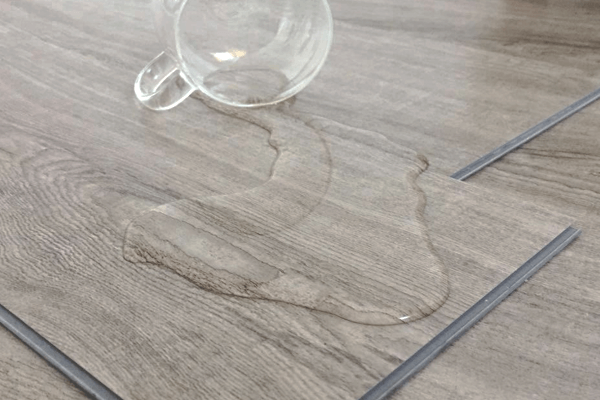Modern interior designs focus on innovative materials. People love materials that resist spills and easily repel stains. Waterproof vinyl plank flooring makes your property better.
Property owners love the aesthetically pleasing look of the material. It looks a lot like tile or hardwood but is cheaper than the two.
The sharp increase in demand is because of the waterproof feature. The popularity will continue to grow because of what it offers. Manufacturers will continue to come up with different styles, formats, and colors.
A suitable material withstands wearing from daily use or activities of your pets and kids. You can install it in any room and still enjoy a better interior look that boosts your interior design.

Contents
What is waterproof flooring?
Answering this question requires understanding the difference between water-resistant and waterproof.
Water-resistant materials can repel water and other spills for some time. But eventually, the water penetrates the surface. Only the top surface is resistant to water or moisture. The material can handle a small spill. However, if the water remains on the surface for long, it penetrates and soaks the flooring material.
But, if the material is waterproof, it can handle small puddles and daily spills. Better still, water will not penetrate the surface even if it remains there for long. However, large leaks can cause discoloration or damage the flooring depending on how long the water stays on the surface.
Vinyl plank flooring material is waterproof, which protects your floor and investment. It doesn’t lose structural integrity when exposed to water. This quality makes it a perfect pick for your bathroom, kitchen, basement, and outdoor.
How does the material stay waterproof?
Waterproof Vinyl plank flooring has a durable and thick core. It has different compositions of WPC or SPC. Stone plastic composite (SPC) and wood-plastic composite (WPC) are waterproof, layered designs. The multiple layers can withstand spills, foot traffic, and scratches.
The layered materials prevent water penetration into the flooring regardless of how long the water remains on the floor. It’s a quality that makes it the ideal flooring for bathrooms and kitchens prone to water spills.
WPC cores are dense, thick, and resilient. They have a softer feel underfoot. You can install it anywhere like in the bathroom, kitchen, basement, living room, and more. Plus, it has ample thickness to cover subfloor imperfections.
However, SPC cores are rigid, denser than WPC, and thin. People use it mainly in commercial buildings in high-traffic areas. It needs a commercially rated wear layer to handle public areas. The ultra-dense core protects it from dents even under heavy furniture.
The flooring option mostly features a backing layer. These serve as sound absorption and provide softness to the floor.
The waterproof feature makes it a better option than hardwood and laminate options. First, vinyl plank is synthetic and can resist water penetration. Moreover, it doesn’t warp or buckle, as is when you use hardwood or laminate flooring.
The material can withstand prolonged exposure to water or spills. Waterproof materials are also resistant to mildew and mold growth.
However, vinyl plank material cannot bear flooding. The water damages the subfloor and destroys the seals. Mainly, it’s because the building materials underneath and around it are not waterproof.
Flooding can cause significant damage. Experts recommend replacing the floor surface material. Do this after clearing the water to make the space healthy and safe.
The long-term cost of waterproof vinyl plank flooring
Waterproof flooring materials are costly. However, they are worth it and better than using water-resistant vinyl flooring. It all depends on where you want to install it and the vinyl product you prefer. Vinyl planks are low maintenance and preferable in both residential and commercial settings.
The flooring has a high-quality construction and exceptional scratch-resistance and durability. Plus, it’s comfortable underfoot, making it a popular choice for home improvement.
The flooring is prone to damage the moment water penetrates the material. It leads to water damage to your floor. The consequences of water penetration include cracks and swelling. Eventually, you need to replace it.
Waterproof vinyl plank flooring is durable and cost-effective in the long run. Installing it gives you peace of mind because it can withstand water leaks. Plus, vinyl floors are scratch-resistant and don’t stain.
What happens if the home floods?
Clean up the water immediately. However, if it’s an extreme water incident like the basement is flooded, do damage control. In a situation where there is water underneath the planks, disassemble the vinyl planks. Go ahead and completely dry the planks and subfloor. Let them dry, then test moisture content before installing your vinyl plank flooring.
If the leak is small, dry the floor using a mop or towel. It protects your floor against mold and mildew growth.
FAQs
Can I install vinyl plank flooring in my basement?
You can install vinyl planks in the basement. However, ensure the concrete floor is level to avoid imperfections that can damage your flooring over time. Install the waterproof vinyl flooring in moisture-prone areas to protect your properties in the basement.
Can I install vinyl plank flooring outdoors?
We don’t recommend installing vinyl flooring outdoors or in semi-outdoor areas. The UV rays make the flooring material fade. Consequently, weather changes cause damage to the flooring over time.
Besides, using vinyl plank flooring outdoors voids the manufacturer’s warranty. It’s safe to stick indoors and abide by the manufacturer’s guidelines.
Should I buy an underlay for the waterproof vinyl plank?
Vinyl planks already have a backing attached to them. Therefore, you don’t need an underlay. However, if your particular waterproof vinyl floor doesn’t have a pre-attached underlay, then consider buying one.
Underlay gives your floor thermal insulation, increases the durability of your floor, and covers your subfloor imperfections.
Can pets scratch vinyl plank floors?
You should install thicker vinyl plank floors for added protection against scratches by pets. Pets usually scratch hard. Therefore, even if the floors are scratch-resistant, their nails or claws leave marks over time.
Final Thoughts
Vinyl plank flooring is waterproof and can transform your residential and commercial floors. Vinyl plank floors can withstand spills for hours without damage. Plus, they are durable and low-maintenance, making them a cost-effective flooring solution.
Upgrade your floors to make them more functional and appealing. Pick a suitable vinyl plank floor that matches your interior design and complements your furnishings. Consider texture, style, and color to ensure your home or commercial space looks splendid. Contact professionals for help with installation. Buy quality vinyl planks from a reputable vendor.
